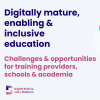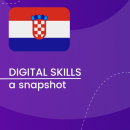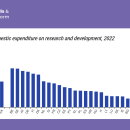e-Schools Programme - Croatia
The e-Schools program is a Croatian initiative by CARNET, the Croatian Academic and Research Network, which ran from 2015 (in its very starting pilot phase of 2015 to 2019) until 2023. The program (the full name of which is 'e-Schools: Comprehensive Computerisation of School Business Processes and Teaching Processes for the Purpose of Creating Digitally Mature Schools for the 21st Century') actively strengthened the quality of the Croatian elementary and middle school education system. As one of the largest digital programs targeting primary and secondary education in Europe, the e-Schools program brought a total of 212 million euros to transform and help digitalise the education sector.
About this initiative
The program fostered the development of more digitally mature schools (i.e. schools that have integrated the use of digital technologies in teaching and learning to a large extent) and boosted capacity-building within schools, whilst preparing students for a digitalised job market.
A pilot project (2015-2019) tested the organisational, technological, and educational aspects of introducing information and communication technology (ICT) in the classroom. The experience of the pilot served as the basis to develop the strategy for a system of digitally mature schools in both primary and secondary educational facilities from the Republic of Croatia, implemented between 2019-2022. The initiative supports long-term sustainability and investments in digital skills through the Strategic Framework for the Digital Maturation of Schools and the School System in the Republic of Croatia (2030).
The program provided a platform for teachers and learners. Teachers are equipped with documents supporting the application of digital content and tools in teaching, an e-diary, instructions for using equipment, online distance learning platform and network portals (e.g., e-laboratory on digital tools). A Technical Support Specialist (STP) assists school staff in using the equipment and network from the project, updates operating systems on the equipment as needed, and reports faults to CARNET.
Why is this a good practice?
The e-School programme has contributed to capacity-building through a wide outreach and engagement by its target audience. While its pilot phase secured digital infrastructure to thousands of students in need of one throughout Croatia, the initiative has grown considerably since, reaching teachers, students, and parents with its resources on 21st century skills.
Pilot stage achievements
The initiative succeeded in distributing personal ICT equipment (tablets, computers) to many students and teachers in Croatia: 26.350 computers were delivered in the project's pilot phase, and another 26.755 went out to students in need during 2021.
More than 150 schools took part in the pilot project from 2015 to 2019, and mobile support teams visited more than 700 school locations with the aim of supporting the digital transformation of education processes by 2022. In 2020, the e-Schools project won 1st place in the category 'Inclusive growth - skills and education for Digital Europe', part of the RegioStars Awards - an EU-level contest that awards the best projects in digital education throughout Europe. In 2021, the program was presented as an example of a good practice in digital skills and jobs at a conference on the topic of cohesion policy and investments in digital education, organised by the Ministry of Regional Development and EU Funds, with the support of the European Commission. In 2022, the citizens of Europe chose the e-School program the second best project in the field of regional development funded by the European Union in the past 15 years.
Achievements overall
According to the EU Court of Auditors, the e-Schools project resulted in a 10% boost of the level of digital maturity in primary and secondary schools across Croatia. As part of the celebration of the completion of the e-Schools program, one of the largest projects for the digitalisation of the primary and secondary education system, 10 Regional Education Centres (ROCs) were officially opened.
The project succeeded in reaching almost all primary and secondary schools in Croatia: school network design activities took place at over 2.400 locations of home and branch schools. Active network equipment was also installed, together with a functional wireless network. In total, the project helped to deliver over 110.000 laptops, 3.000 interactive screens and a wireless network covering all primary and secondary schools in Croatia. Almost 70.000 participants took part in more than 70 workshops, webinars and online courses. More than 25.000 educational materials, including open educational resources and teaching scenarios can be found on the dedicated educational platform. Their templates are scalable, and offer an integrated approach to embedding digital within education.
The e-Schools national project is a good example of an all-encompassing approach for the digital transformation of the education system. It fosters the development of innovative teaching practices through the thousands of resources and 8 e-services. The project also pioneered a Framework for Digital School Maturity, a tool to evaluate and enhance digital readiness worldwide, aligning Croatian schools to wider EU frameworks.








